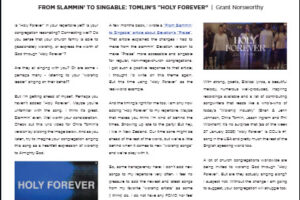Take this link to read Grant’s article as featured in the March issue of Worship…

IS “NEAR ENOUGH” THE BEST WE CAN BE?
By Grant Norsworthy
If you want your team members to bring their “A” game every time, the leadership style of the team leader plays an enormously influential role.
As I travel and work with Church music teams, I see two diametrically opposed styles of leadership. The first I call the “Near Enough” leadership style. The second leadership style I call “Best We Can Be”.
Which of the two is your experience?
Picture this. Choose your response.
AN EXAMPLE SITUATION
You’re the Musical Director (MD). It’s during rehearsal and you’re explaining to the band how you’d like one song to transition into another. As you’re speaking, the electric guitarist is noodling, two of the singers are chatting to one another and the bassist is tapping away at her phone. What do you do?
- You try to ignore the distractions and keep right on talking, hoping that it’ll be okay.
- Forcibly confront the offenders to bring them into line before continuing. This might involve a raised voice, even yelling and perhaps a “me against you” glare of disapproval.
- Stop talking. Raise one clenched fist high above your head in the agreed and understood posture that lets everyone know that you need their attention. Smile (without any satirical pepper) and wait.
TWO LEADERSHIP STYLES
If you chose option A, you just might be a “Near Enough” leader. You’d rather allow your Church family’s musical expression of worship to God be less than it could be than risk any sort of inter-personal awkwardness.
You probably didn’t choose option B. Christians are far too “nice” to ever speak like that, right? If you did choose option B, or could ever react that way when exhaustion and/or stresses are high, you might want to be a “Best We Can Be” leader, but your leadership in that moment was counterproductive. “Me against you” confrontation is ugly and could result in team members withdrawing their availability to serve. They might even leave the church.
Option A and B are driven, at least in part, by fear. Fear of discomfort. Fear of not being liked. Fear of team members being unhappy. Fear of not being in control or respected. Fear of not being good enough.
Option C is the choice of the “Best We Can Be” leader. The motivation is love. Love for God, The Church, our congregation, the team members. Love for music and the love of inviting a group of people to sing as a sincere expression of worship to God.
I believe that we are all inspired to give our best effort and strive for new heights of achievement when we know that what we’re doing is important. When expectations and the rationale behind them are clear. When we have a strong sense that we – as individuals – are a small part of something much bigger than ourselves.
Team members will be prepared to work hard and give their best when they are being led to where we have a strong sense that, as Aristotle said, “The whole is greater than the sum of its parts”.
If you want your team members to bring their “A game” every time, the leadership style of the team leader plays an enormously influential role.
“NEAR ENOUGH” LEADERSHIP
In my experience of Church music teams, “Near Enough” leadership is the most common. This approach is characterized by having only low demands placed on team members. Keeping the peace is an imperative. The “vibe” must always be light. Never heavy.
If there are stated expectations – for things like personal preparedness or being ready for rehearsal on time – they routinely go unmet without any follow up. Individuals are never specifically challenged to do better. The leadership is generally accepting of whatever standard the volunteers bring.
The “Near Enough” leadership style promotes team members doing as little work as possible. Just enough to get by. It communicates that the music we’re presenting is not that big of a deal. Near enough is – or will have to be – good enough.
“BEST WE CAN BE” LEADERSHIP
“Best We Can Be” leadership aims for excellence, even if that requires hard, focused work, attention to detail and being willing to undergo the discomfort of speaking and hearing criticism. It communicates an infectious passion to get it right, saying, “This music is important. Let’s make it the best we possibly can!”
“Best We Can Be” leadership promotes drawing satisfaction from doing the hard work, giving our best and aiming for a level of excellence that is beyond where we are now. It invites the team members to taste a higher joy from music – beyond just singing, playing or engineering.
It beckons us to play an important part in assisting our Church family to connect more deeply with each other and with Almighty God through songs. For a band, what could be bigger or more important than that!?
AN ANECDOTE
I was MDing my one and only rehearsal with a band of college students in preparation for leading worship through songs for their school chapel service. Each singer and instrumentalist seemed very happy with the sound we were making, but I had a major problem: The drumming.
While very capable in some ways, the drummer was not good at THE MOST IMPORTANT thing that drummers need to do. He was not keeping solid time. Every time he did a drum fill – and he was doing a lot of them – he would increase his tempo. Rush, then slow down again after each fill. To me, it was like the sound of a drum kit being pushed down a stairwell, with the rest of the band following closely behind.
It was hard for me to play with. Very difficult to sing to. And I knew that our congregation would struggle to sing as well. But no-one else seemed to be worried. If they knew the problem, they weren’t calling it out.
There was neither time nor the facility to introduce a metronome click. What should I do? Right then, I needed to make a tough-love leadership decision.
There are plenty of seemingly good reasons why I should have just put up with it. I was the guest – the outsider. I didn’t want to upset anybody. They’re not professionals. They’ve kindly volunteered to help me. It’s not that bad. The drummer, John (not his real name) was probably totally unaware of this issue. Was now the right time to raise it?
I raised it.
“Hey everyone, there’s a lot going on here that’s working well, but, I must tell you, I’m really struggling. We have not yet found our groove. Our timing is loose. With no groove, I believe the congregation will struggle to sing along as well as they could and less than we’d like.”
With a gentle smile, I then turn my attention to the guy on the drum stool.
“John, as the drummer, I am sure you’re aware that you are the BOSS of time for our band. You’re the one telling us where the beat is! You’re the foundation that the house is built on! Right?”
John agrees. Then I ask a question that I know the answer to.
“John, do you practice much with a metronome?”
He doesn’t.
“Hey please forgive my directness, but I hear a problem in your drumming that I hear from a lot of drummers. Because you have not yet practiced enough with a metronome, you think you are keeping solid time, but, actually, you are not.”
John’s face drops. The gasp from the other band members – John’s friends – is almost audible. Perhaps no one has ever spoken in a band rehearsal like this before.
“Hey, we all want to present these songs the best we can. We want the students to sing these songs of praise with some passion and volume, right?”
Everyone, including John, agrees.
“Okay. So I think there’s one thing we can do to better achieve our goals. Will you work with me on this John? Try a suggestion of mine, maybe just for this morning?”
John agrees. I explain what I hear with each drum fill. I ask John to play the same song again, but without any fills. “Just like you’re a drum machine’s preset beat, okay?” I encourage him to focus on groove, keeping solid time and to listen to how he is leading everyone else’s sense of time. Like a champ, he does it.
Immediately, the time keeping is MUCH better. The band is more together. We’ve found something close to groove. It’s not perfect, but it’s a massive improvement. So massive that others can hear it too.
I stop the band at the end of the first chorus.
“Oh wow, John. That felt SO much better to me! I know drum fills can be cool, but if we don’t have groove – solid time – we don’t have the solid foundation that we need.”
John’s looking unsure. His torso scrunches a little lower and he looks away from my gaze. I can tell he misses his fills. John does not yet realize that he’s played the best sounding music he’s ever been part of making. So I turn to the rest of the band.
“How did everyone else feel?”
All the band members are smiling broadly, nodding.
“Yeah, that was much better.”
“That was great.”
“Much more solid”.
John sits a little taller on his stool. He affords himself a nonchalant smile.
“And vocalists – did you feel like it was easier to sing when we had better time?”
They agree emphatically.
“If you can play like that for the chapel service, John, I am sure that the students will sing these songs – these praises and prayers to God – much better. Will you do that please?”
During the band’s songs for the chapel service, John (pretty much) did what I asked of him. The congregation sang and sang well. John, me and the rest of the band were part of something WAY bigger than ourselves. Goal achieved.
I leave John after the service with a smile and a hand shake. He thanks me. I thank him. I encourage him to practice with a metronome. Maybe even play with it at rehearsals and future engagements. He knows he is free to reintroduce fills, but NEVER at the expense of timekeeping. Groove. He assures me that he will.
He’s on the way to being a better drummer. The band to being a better band.
CONCLUSION
The thing that takes our band from being just “Near Enough” to being “The Best We Can Be” is attention to detail. Let’s make sure we have solid time, that the instruments are in tune, the volume levels are appropriate, the notes are correct, parts are well crafted, the lyrics are right, the arrangement are uncluttered, the tones are dialed in, we know how songs start and end and the mix is musical and inspiring.
And if a team member falls short of the agreed expectations by not doing enough personal practice before rehearsal, or showing up late, or anything else, please choose to do the tough-but-loving thing. Don’t be fearful. Speak with them about it.
So, do we choose fear or love?
I choose love. And love is sometimes tough.
So, whether you eat or drink, or whatever you do, do all to the glory of God. – 1 Corinthians 10:31 (ESV)
This article was first published by Worship Tech Director of the WFX Network on December 15, 2017


